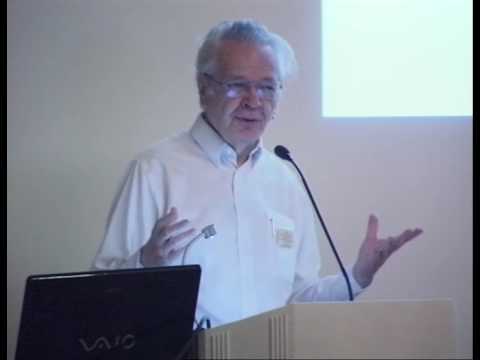A Primer for Deterministic Thermodynamics and Cryodynamics
Dedicated to the Founder of Synergetics, Hermann Haken
Otto E. Rossler, Frank Kuske, Dieter Fröhlich, Hans H. Diebner, Thimo Bo¨ hl, Demetris T. Christopoulos, Christophe Letellier
Abstract The basic laws of deterministic many-body systems are summarized in the footsteps of the deterministic approach pioneered by Yakov Sinai. Two fundamental cases, repulsive and attractive, are distinguished. To facilitate comparison, long-range potentials are assumed both in the repulsive case and in the new attractive case. In Part I, thermodynamics – including the thermodynamics of irreversible processes along with chemical and biological evolution – is presented without paying special attention to the ad hoc constraint of long-range repulsion. In Part II, the recently established new fundamental discipline of cryodynamics, based on long-range attraction, is described in a parallel format. In Part III finally, the combination (“dilute hot-plasma dynamics”) is described as a composite third sister discipline with its still largely unknown properties. The latter include the prediction of a paradoxical “double-temperature equilibrium” or at least quasi-equilibrium existing which has a promising technological application in the proposed interactive local control of hot-plasma fusion reactors. The discussion section puts everything into a larger perspective which even touches on cosmology.
In Part II, the recently established new fundamental discipline of cryodynamics, based on long-range attraction, is described in a parallel format. In Part III finally, the combination (“dilute hot-plasma dynamics”) is described as a composite third sister discipline with its still largely unknown properties. The latter include the prediction of a paradoxical “double-temperature equilibrium” or at least quasi-equilibrium existing which has a promising technological application in the proposed interactive local control of hot-plasma fusion reactors. The discussion section puts everything into a larger perspective which even touches on cosmology.
Keywords: Sinai gas, chaos theory, heat death, dissipative structures, second arrow, Point Omega, Super Life, paradoxical cooling, antifriction, paradoxical acceleration, Sonnleitner numerical instability, dilute-plasma paradigm, two-temperature equilibrium, ITER, MHD, interactive plasma cooling, McGuire reactor, Hubble law, Zwicky rehabilitated, Perlmutter-Schmidt-Riess wiggle, mean cosmic temperature, van Helmont, Lavoisier, Kant, Poincaré, double-faced Sonnleitner map. (August 26, 2016)
Continue reading “A Primer for Deterministic Thermodynamics and Cryodynamics” »





 In Part II, the recently established new fundamental discipline of cryodynamics, based on long-range attraction, is described in a parallel format. In Part III finally, the combination (“dilute hot-plasma dynamics”) is described as a composite third sister discipline with its still largely unknown properties. The latter include the prediction of a paradoxical “double-temperature equilibrium” or at least quasi-equilibrium existing which has a promising technological application in the proposed interactive local control of hot-plasma fusion reactors. The discussion section puts everything into a larger perspective which even touches on cosmology.
In Part II, the recently established new fundamental discipline of cryodynamics, based on long-range attraction, is described in a parallel format. In Part III finally, the combination (“dilute hot-plasma dynamics”) is described as a composite third sister discipline with its still largely unknown properties. The latter include the prediction of a paradoxical “double-temperature equilibrium” or at least quasi-equilibrium existing which has a promising technological application in the proposed interactive local control of hot-plasma fusion reactors. The discussion section puts everything into a larger perspective which even touches on cosmology.

 Feynman told us clearly: “Science is the belief in the ignorance of experts.” Check anything from first principles and experience, ignoring no logical holes, and that is science. Cargo Cult Science arises when the opposing arguments aren’t emphasized. Experts then form and pass down firm beliefs that are delusions. Cargo Cult science is like a perfect replica radio made all of wood: it may have all the trappings of degrees and chairs and journals, but it is missing the key ingredient and won’t function.[1][2]
Feynman told us clearly: “Science is the belief in the ignorance of experts.” Check anything from first principles and experience, ignoring no logical holes, and that is science. Cargo Cult Science arises when the opposing arguments aren’t emphasized. Experts then form and pass down firm beliefs that are delusions. Cargo Cult science is like a perfect replica radio made all of wood: it may have all the trappings of degrees and chairs and journals, but it is missing the key ingredient and won’t function.[1][2]






